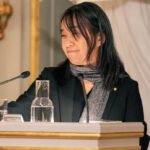
Winning author Mohamed-Samir-Nada at the 2025 International Award for Arabic Fiction ceremony on April 24 in Abu Dhabi. Image: IPAF, Khéridine Mabrouk, Shaaman
By Porter Anderson, Editor-in-Chief | @Porter_Anderson
‘Considerable Virtuosity and Narrative Acumen’
This evening (April 24) in Abu Dhabi, the International Prize for Arabic Fiction has been awarded to the Egyptian writer Mohamed Samir Nada for The Prayer of Anxiety, which is published by Masciliana.
 Nada receives an award of US$50,000, and each of the program’s six shortlistees this year receives $10,000.
Nada receives an award of US$50,000, and each of the program’s six shortlistees this year receives $10,000.
The Prayer of Anxiety is Nada’s third novel. The jury’s selection of his work makes him the first Egyptian winner of the prize since 2009.
In her comments on the jury’s rationale, the jury chair, Mona Baker, said, “The Prayer of Anxiety won because it successfully transforms anxiety into an aesthetic and intellectual experience that resonates with the reader and awakens her or him to pressing existential questions.”
She said that Nada “blends polyphony and symbolism with captivating poetic language, making reading a sensory experience in which revelation intersects with silence, and truth with illusion.
“In this novel, Nagaa al-Manasi is more than just a village in Upper Egypt. It becomes a metaphor for societies besieged by fear and authoritarianism, giving the novel dimensions that transcend geography and touch on universal human themes.”

‘The Prayer of Anxiety,’ published by Masciliana
Yasir Suleiman, the chair of the board for the award program, says, “The Prayer of Anxiety is an outstandingly beautiful and intriguing novel. Referencing history, its immediate conceptualization around the 1967 war does not make it a historical novel. The occasion of this war is cleverly used to probe the structure of political tyranny in an isolated and forgotten village in Egypt.
“Coercion, manipulation, the danger of being co-opted, and the obscuring of meaning drive the inhabitants into submission and despair. Turning to organized religion for worldly redemption through a hurriedly concocted ‘prayer of anxiety’ offers little solace. Instead, it brings occasion for dispute and no clear way out. …
“Crafted with considerable virtuosity and narrative acumen, The Prayer of Anxiety is engaging and thought-provoking. It’s destined to become a classic in the Arab literary scene in years to come.”
Nada works as the financial director for a tourism company in Cairo. His two previously published novels are Malika’s Kingdom (2016) and The Confession of the Walls (2021).
The 2025 International Prize for Arabic Fiction Shortlist
The shortlist’s authors this year have come from Egypt, Iraq, Lebanon, Syria, the United Arab Emirates, and—in a first for this competition’s shortlist—Mauritania. The shortlisted authors range in age from 38 to 58.
In the shortlist, authors listed alphabetically by surname.
| Author | Title | Country of Origin | Publisher |
| Ahmed Fal Al Din | Danshmand | Mauritania | Masciliana |
| Azher Jirjees | The Valley of the Butterflies | Iraq | Dar al-Rafidain |
| Taissier Khalaf | The Andalusian Messiah | Syria | Al-Mutawassit |
| Mohamed Samir Nada | The Prayer of Anxiety | Egypt | Masciliana |
| Nadia Najar | The Touch of Light | United Arab Emirates | Al-Mutawassit |
| Haneen Al-Sayegh | The Women’s Charter | Lebanon | Dar al-Adab |
Disambiguation: Not ‘the Arabic Booker’

At the 2025 award ceremony for the International Prize for Arabic Fiction are, from left, jury chair Mona Baker; board chair Yasir Suleiman; presenter Asma Siddiq Al-Mutawa; 2025 laureate Mohamed Samir Nada; Dr. Ali Bin Tamim of the Abu Dhabi Arabic Language Center, the award’s sponsor; and the award program’s administrator, Fleur Montanaro. Image: IPAF, Khéridine Mabrouk, Shaaman
For clarification, the International Prize for Arabic Fiction sometimes is called “the Arabic Booker,” but the program’s organizers say they’re ready to see the end of the misinformation of that terminology.
 While it was initially mentored by the Booker Prize Foundation in London, the International Prize for Arabic Fiction’s organizers have stressed that the Arabic Booker phrase is “not instigated nor endorsed at all by the International Prize for Arabic Fiction or the Booker Prize Foundation, which are two completely separate, independent organizations.”
While it was initially mentored by the Booker Prize Foundation in London, the International Prize for Arabic Fiction’s organizers have stressed that the Arabic Booker phrase is “not instigated nor endorsed at all by the International Prize for Arabic Fiction or the Booker Prize Foundation, which are two completely separate, independent organizations.”
In an ongoing cooperative measure, the International Prize for Arabic Fiction again this year is sponsored by the Abu Dhabi Arabic Language Centre, which under the direction of Dr. Ali Bin Tamim produces the Sheikh Zayed Book Award, with its 7.8-million-dirham purse (US$2.1 million), annually recognizing winning books in nine categories and a “Cultural Personality of the Year.”
The Cultural Personality honor includes a purse of 1 million dirhams (US$272,262).
Both of these award programs make generous efforts in funding the translation of Arabic content into other languages.
You can see a recording of Thursday’s award ceremony here:
More from Publishing Perspectives on the International Prize for Arabic Fiction is here, and more on international publishing and book prizes in general is here. More on translation is here, and more on Arabic in the publishing world is here. More on the Abu Dhabi International Book Fair is here, and more on the Abu Dhabi Arabic Language Center and the work of Dr. Ali Bin Tamim is here.
Publishing Perspectives is the world media partner of the Sheikh Zayed Book Award and the Abu Dhabi International Book Fair.
About the Author




